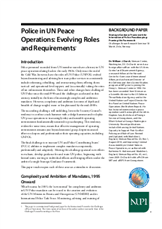BACKGROUND PAPER Police in UN Peace Operations: Evolving Roles and Requirements

Police personnel seconded from UN member states have a history in UN peace operations dating back to the early 1960s. Only since the end of the Cold War, however, have the roles of UN Police (UNPOL) evolved beyond monitoring and advising host state police services to consistently include reforming, rebuilding, and restructuring them; offering them tactical- and operational-level support; and (occasionally) taking the reins of law enforcement themselves.
These and other changes have challenged UN Police since the mid-1990s and the challenges accelerated in this century, initially in the form of increasingly complex and ambitious mandates. However, complexity and ambition (in terms of depth and breadth of change sought) moreor less plateaued by the mid-2000s.
The succeeding challenge, still unfolding, lies in the Security Council’s tendency to confuse a tack hammer with a sledge hammer and to deploy UN peace operations to increasingly risky and unstable operating environments fundamentally unsuited to peacekeeping. This tendency, evident for some time, means that effective management of operating environments remains just beyond missions’ grasp, despite increased efforts to deepen and professionalize their operating capacities, including
UNPOL.
The final challenge is to increase UN and Police Contributing States’ (PCCs’) abilities to implement complex mandates competently, professionally and adaptively. Meeting this challenge spawned new efforts to evaluate, develop guidance for and train UN police, beginning with formed units, moving to individual officers and bringing efforts under the ambit of a single Strategic Guidance Framework.
This paper touches upon each of these areas as a stimulus to discussion.

